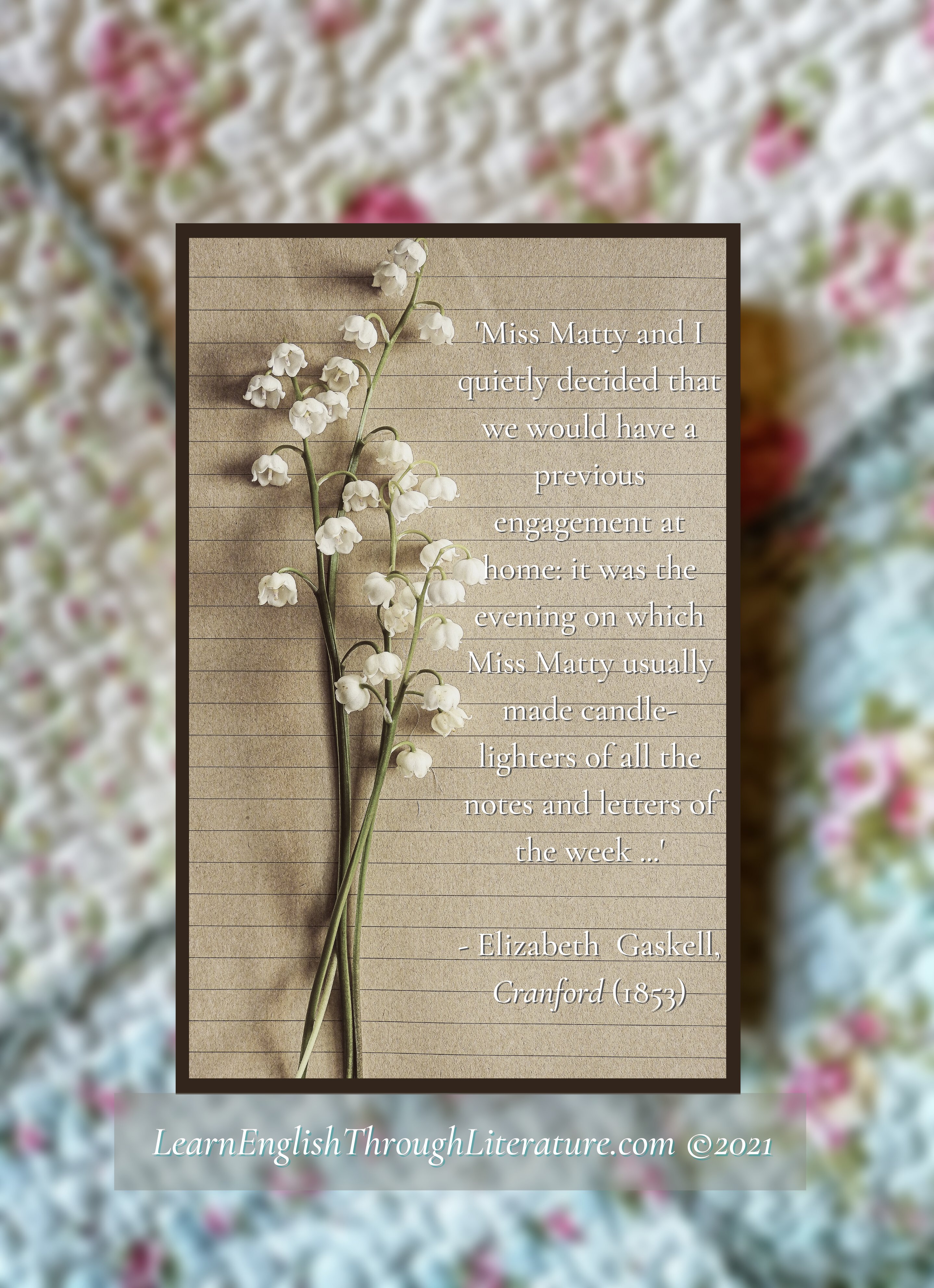📙 ‘There was all the more time for me to hear old-world stories from Miss Pole, while she sat knitting, and I making my father’s shirts.’
– Elizabeth Gaskell, Cranford (1853)
…
✏️ (If you missed the first part of this Lesson on prepositions of time, you can find it here). ✏️
…
📝 #5 WHILE
This is used when describing
- an action, usually with a verb: ‘while I was reading …’, ‘while talking with my friends …’, etc.
We are drawing our examples of these prepositions ‘in action’ directly from Gaskell’s Cranford:
📙 ‘Many a time, while I was unpacking, did she come backwards and forwards to stir the fire which burned all the worse for being so frequently poked.’
– Elizabeth Gaskell, Cranford
📙 ‘While she was away, Miss Matty and I huddled over the fire, talking in a low and awe-struck voice.’
– Elizabeth Gaskell, Cranford
…
📝 #6 DURING
This is used to talk about
- the process of an activity: ‘during the play’, ‘during the trip’, ‘during the school day’
- to talk about a period of time: ‘during the morning’, ‘during the day’, ‘during the month’. Note: we can also use ‘in’ in these contexts: e.g., ‘in the morning’, ‘in the day’, ‘in the month’.
📙 ‘Her sales of tea during the first two days had surpassed my most sanguine expectations.’
– Elizabeth Gaskell, Cranford
📙 ‘The Assembly Room had been added to the inn, about a hundred years before, by the different county families, who met together there once a month during the winter to dance and play at cards.’
– Elizabeth Gaskell, Cranford
…
📝 #7 UNTIL
This marks
- the end of an action: ‘We will be away on holidays until the 15th’ or ‘I studied until midnight’.
Again, from Cranford:
📙 ‘The stranger wore a blue coat with brass buttons, drab breeches, and gaiters, and drummed with his fingers on the counter until he was attended to.’
– Elizabeth Gaskell, Cranford
📙 ‘I pondered and pondered until dinner was announced by Martha, with a face all blubbered and swollen with crying.’
– Elizabeth Gaskell, Cranford
…
📝 #8 BY
We use this to indicate
- that something is ‘before’ or ‘no later than’: e.g., ‘We will have finished our dinner by 6 o’clock’; or, ‘I waited for her at the station for a long time, but by 8pm I decided to phone her.’
As you can see from this example, we often use ‘by’ with descriptions of the hour (by the clock):
📙 ‘Miss Pole told us she had absolutely taken time by the forelock, and been dressed by five o’clock, in order to be ready if the St James’s Chronicle should come in at the last moment …’
– Elizabeth Gaskell, Cranford (emphasis mine)
…
📝 #9 SINCE
📙 ‘It was five or six years since she had given up shop, so in any other place than Cranford her dress might have been considered passée.’
– Elizabeth Gaskell, Cranford (emphasis mine)
This describes
- a point of time in the past that has continued until now: ‘I have been drinking tea for breakfast since childhood’, ‘That noise has been ongoing non-stop since 3 in the morning’, ‘I have felt so welcome since my arrival’, etc.
Let us close with some final (and fitting, or suitable) lines from Cranford:
📙 ‘Ever since that day there has been the old friendly sociability in Cranford society; which I am thankful for, because of my dear Miss Matty’s love of peace and kindliness.’
– Elizabeth Gaskell, Cranford
…
I have tried to clarify the definitions of and differences between these prepositions of time, and I hope I have done so concisely and plainly.
But I understand that just having the knowledge of something is not quite as helpful as having a chance to practice what you have learned, so if you are interested in practicing, testing, and strengthening what you have learned here through an individualised lesson, you can contact me through this page. 👈
⏳ I have only a couple of places available at the moment, so don’t spend too long thinking about it because while you are doing so, some other student might secure their one-on-one lessons with me in the meantime! ⏳⌛




